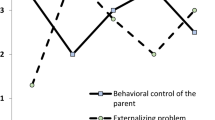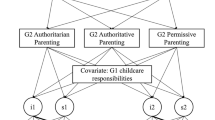Abstract
Creative and methodologically sophisticated longitudinal research on bidirectionality in parenting and child behavior can shed important new light on the dynamics of behavior-problem development. The articles assembled for this Special Section are at the forefront of efforts aimed at tracing the interplay of parenting behavior and child and adolescent adjustment problems over time. In this commentary, we provide a brief overview of thinking and research on bidirectionality and then highlight key themes and findings reported in these articles. We describe some of the challenges in research on bidirectional processes and offer some recommendations for future research in this area.
Similar content being viewed by others
References
Anderson, K. E., Lytton, J., & Romney, D. M. (1986). Mothers’ interactions with normal and conduct-disordered boys: who affects whom? Developmental Psychology, 22, 604–609.
Bates, J. E. (1976). Effects of children’s nonverbal behavior upon adults. Child Development, 47, 1079–1088.
Bates, J. E., & Pettit, G. S. (1981). Adult individual differences as moderators of child effects. Journal of Abnormal Child Psychology, 9, 329–340.
Bates, J. E., & Pettit, G. S. (2007). Temperament, parenting, and socialization. In J. Grusec, & P. Hastings (Eds.), Handbook of socialization (pp. 153–177, 2nd ed.). New York: Guilford Press.
Bates, J. E., Pettit, G. S., Dodge, K. A., & Ridge, B. (1998). The interaction of temperamental resistance to control and restrictive parental discipline in the development of externalizing problems. Developmental Psychology, 34, 982–995.
Bell, R. Q. (1968). A reinterpretation of the direction of effects in studies of socialization. Psychological Review, 75, 81–95.
Burke, J. D., Pardini, D. A., & Loeber, R. (2008). Reciprocal relationships between parenting behavior and disruptive psychopathology from childhood through adolescence. Journal of Abnormal Child Psychology, DOI 10.1007/s10802-008-9219-7.
Crouter, A. C., Bumpus, M. F., & Davis, K. D. (2005). How do parents learn about adolescents’ experiences? Implications for parental knowledge and adolescent risky behavior. Child Development, 76, 869–882.
Deater-Deckard, K., Dodge, K. A., Bates, J. E., & Pettit, G. S. (1996). Physical discipline among African–American and European–American mothers: links to children's externalizing behaviors. Developmental Psychology, 32, 1065–1072.
Dodge, K. A., & Pettit, G. S. (2003). A biopsychosocial model of the development of chronic conduct problems in adolescence. Developmental Psychology, 39, 349–378.
Dumas, J. E., & LaFreniere, P. J. (1993). Mother–child relationships as sources of support or stress: a comparison of competent, average, aggressive, and anxious dyads. Child Development, 64, 1732–1754.
Dunn, J. (1997). Commentary: lessons from the study of bidirectional effects. Journal of Social and Personal Relationships, 14, 565–573.
Gross, H. E., Shaw, D. S., & Moilanen, K. L. (2008). Reciprocal associations between boys’ externalizing problems and mothers’ depressive symptoms. Journal of Abnormal Child Psychology, DOI 10.1007/s10802-008-9224-x.
Gunnoe, M. L., & Mariner, C. L. (1997). Toward a developmental–contextual model of the effects of parental spanking on children’s aggression. Archives of Pediatric and Adolescent Medicine, 151, 768–775.
Hipwell, A., Keenan, K., Kasza, K., Loeber, R., Stouthamer-Loeber, M., & Bean, T. (2008). Reciprocal influences between girls’ conduct problems and depression, and parental punishment and warmth: A six year prospective analysis. Journal of Abnormal Child Psychology, DOI 10.1007/s10802-007-9206-4.
Kuczynski, L., Marshall, S., & Schell, K. (1997). Value socialization in a bidirectional context. In J. E. Grusec, & L. Kuczynski (Eds.), Parenting and children's internalization of values: a handbook of contemporary theory (pp. 23–50). Hoboken, NJ: Wiley.
Laird, R. D., Pettit, G. S., Bates, J. E., & Dodge, K. A. (2003). Parents’ monitoring knowledge and adolescents’ delinquent behavior: evidence of correlated developmental changes and reciprocal influences. Child Development, 74, 752–768.
Lansford, J. E., Chang, L., Dodge, K. A., Malone, P. S., Oburu, P., Palmérus, K., et al. (2005). Physical discipline and children’s adjustment: cultural normativeness as a moderator. Child Development, 76, 1234–1246.
Lansford, J. E., Deater-Deckard, K., Dodge, K. A., Bates, J. E., & Pettit, G. S. (2004). Ethnic differences in the link between physical discipline and later adolescent externalizing behaviors. Journal of Child Psychology and Psychiatry, 45, 801–812.
Larsson, H., Viding, E., & Rijsdijk, F. V. (2008). Relationships between parental negativity and childhood antisocial behavior over time: A bidirectional effects model in a longitudinal genetically informative design. Journal of Abnormal Child Psychology, DOI 10.1007/s10802-007-9151-2.
Lollis, S., & Kuczynski, L. (1997). Beyond one hand clapping: seeing bidirectionality in parent–child relations. Journal of Social and Personal Relationships, 14, 441–462.
Pardini, D. A., Fite, P. J., & Burke, J. D. (2008). Bidirectional associations between parenting practices and conduct problems in boys from childhood to adolescence: the moderating effect of age and African–American ethnicity. Journal of Abnormal Child Psychology, DOI 10.1007/s10802-007-9162-z.
Patterson, G. R., Reid, J. B., & Dishion, T. J. (1992). Antisocial boys. Eugene, OR: Castalia.
Pelham, W. E., Lang, A. R., Atkeson, B., Murphy, D., Gnagy, E. M., Greiner, A. R., et al. (1997). Effects of deviant child behavior on parental distress and alcohol consumption in laboratory interactions. Journal of Abnormal Child Psychology, 25, 413–424.
Pettit, G. S., Bates, J. E., & Dodge, K. A. (1997). Supportive parenting, ecological context, and children’s adjustment: a seven-year longitudinal study. Child Development, 68, 908–923.
Pettit, G. S., Keiley, M. K., Laird, R. D., Bates, J. E., & Dodge, K. A. (2007). Predicting the developmental course of mother-reported monitoring across childhood and adolescence from early proactive parenting, child temperament, and parents’ worries. Journal of Family Psychology, 21, 206–217.
Pettit, G. S., & Lollis, S. P. (1997). Reciprocity and bidirectionality in parent–child relationships: New approaches to the study of enduring issues. Journal of Social and Personal Relationships, 14, 435–440.
Phares, V., Fields, S., Kamboukos, D., & Lopez, E. (2005). Still looking for Poppa. American Psychologist, 60, 735–736.
Russell, A., Pettit, G. S., & Mize, J. (1998). Horizontal qualities in parent–child relationships: parallels with and possible consequences for children's peer relationships. Developmental Review, 18, 313–352.
Sameroff, A. (1975). Transactional models in early social relations. Human Development, 18, 65–79.
Shaw, D. S., Bell, R. Q., & Gilliom, M. (2000). A truly early starter model of antisocial behavior revisited. Clinical Child and Family Psychology Review, 3, 155–172.
Stattin, H., & Kerr, M. (2001). Parental monitoring: a reinterpretation. Child Development, 71, 1072–1085.
Stewart, E. A., Simons, R. L., Conger, R. D., & Scaramella, L. V. (2002). Beyond the interactional relationship between delinquency and parenting practices: the contribution of legal sanctions. Journal of Research in Crime and Delinquency, 39, 36–59.
Author information
Authors and Affiliations
Corresponding author
Rights and permissions
About this article
Cite this article
Pettit, G.S., Arsiwalla, D.D. Commentary on Special Section on “Bidirectional Parent–Child Relationships”: The Continuing Evolution of Dynamic, Transactional Models of Parenting and Youth Behavior Problems. J Abnorm Child Psychol 36, 711–718 (2008). https://doi.org/10.1007/s10802-008-9242-8
Published:
Issue Date:
DOI: https://doi.org/10.1007/s10802-008-9242-8




